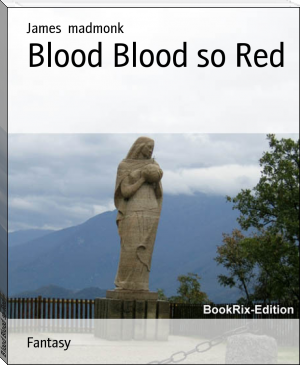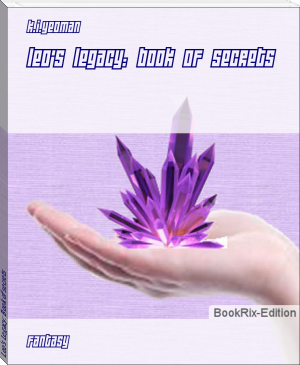Robin Hood, J. Walker McSpadden [book recommendations for teens .TXT] 📗

- Author: J. Walker McSpadden
Book online «Robin Hood, J. Walker McSpadden [book recommendations for teens .TXT] 📗». Author J. Walker McSpadden
But of this adventure you shall be told in the next tale; for I have already shown you how Sir Richard of the Lea repaid his debt, with interest.
CHAPTER XXII HOW KING RICHARD CAME TO SHERWOOD FOREST King Richard hearing of the pranks Of Robin Hood and his men, He much admired and more desired To see both him and them. Then Robin takes a can of ale: “Come let us now begin; And every man shall have his can; Here’s a health unto the King!”
Friar Tuck had nursed Little John’s wounded knee so skilfully that it was now healed. In sooth, the last part of the nursing depended more upon strength than skill; for it consisted chiefly of holding down the patient, by main force, to his cot. Little John had felt so well that he had insisted upon getting up before the wound was healed; and he would have done so, if the friar had not piled some holy books upon his legs and sat upon his stomach.
Under this vigorous treatment Little John was constrained to lie quiet until the friar gave him leave to get up. At last he had this leave, and he and the friar went forth to join the rest of the band, who were right glad to see them, you may be sure. They sat around a big fire, for ‘twas a chilly evening, and they feasted and made merry, in great content.
A cold rain set in, later, but the friar wended his way back, nathless, to his little hermitage. There he made himself a cheerful blaze, and changed his dripping robe, and had sat himself down, with a sigh of satisfaction, before a tankard of hot mulled wine and a pasty, when suddenly a voice was heard on the outside, demanding admission. His kennel of dogs set up furious uproar, on the instant, by way of proving the fact of a stranger’s presence.
“Now by Saint Peter!” growled the friar, “who comes here at this unseemly hour? Does he take this for a hostelry? Move on, friend, else my mulled wine will get cold!”
So saying he put the tankard to his lips, when a thundering rap sounded upon the door-panel, making it to quiver, and causing Tuck almost to drop his tankard; while an angry voice shouted, “Ho! Within there! Open, I say!”
“Go your way in peace!” roared back the friar; “I can do nothing for you. ‘Tis but a few miles to Gamewell, if you know the road.”
“But I do not know the road, and if I did I would not budge another foot. ‘Tis wet without and dry within. So open, without further parley!”
“A murrain seize you for disturbing a holy man in his prayers!” muttered Tuck savagely. Nathless, he was fain to unbar the door in order to keep it from being battered down. Then lighting a torch at his fire and whistling for one of his dogs, he strode forth to see who his visitor might be.
The figure of a tall knight clad in a black coat of mail, with plumed helmet, stood before him. By his side stood his horse, also caparisoned in rich armor.
“Have you no supper, brother?” asked the Black Knight curtly. “I must beg of you a bed and a bit of roof, for this night, and fain would refresh my body ere I sleep.”
“I have no room that even your steed would deign to accept, Sir Knight; and naught save a crust of bread and pitcher of water.”
“I’ faith, I can smell better fare than that, brother, and must e’en force my company upon you, though I shall recompense it for gold in the name of the church. As for my horse, let him but be blanketed and put on the sheltered side of the house.”
And without further parley the knight boldly strode past Tuck and his dog and entered the hermitage. Something about his masterful air pleased Tuck, in spite of his churlishness.
“Sit you down, Sir Knight,” quoth he, “and I will fasten up up your steed, and find him somewhat in the shape of grain. Half, also, of my bed and board is yours, this night; but we shall see later who is the better man, and is to give the orders!”
“With all my soul!” said the knight, laughing. “I can pay my keeping in blows or gold as you prefer.”
The friar presently returned and drew up a small table near the fire.
“Now, Sir Knight,” quoth he, “put off your sword and helm and such other war-gear as it pleases you, and help me lay this table, for I am passing hungry.”
The knight did as he was told, and put aside the visor which had hid his face. He was a bronzed and bearded man with blue eyes, and hair shot with gold, haughty but handsome withal.
Then once again the priest sat him down to his pasty and mulled wine, right hopefully. He spoke his grace with some haste, and was surprised to hear his guest respond fittingly in the Latin tongue. Then they attacked the wine and pasty valiantly, and the Black Knight made good his word of being in need of refreshment. Tuck looked ruefully at the rapidly disappearing food, but came to grudge it not, by reason of the stories with which his guest enlivened the meal. The wine and warmth of the room had cheered them both, and they were soon laughing uproariously as the best of comrades in the world. The Black Knight, it seemed, had traveled everywhere. He had been on crusades, had fought the courteous Saladin, had been in prison, and often in peril. But now he spoke of it lightly, and laughed it off, and made himself so friendly that Friar Tuck was like to choke with merriment. So passed the time till late; and the two fell asleep together, one on each side of the table which had been cleared to the platters.
In the morning Friar Tuck awoke disposed to be surly, but was speedily mollified by the sight of the Black Knight, who had already risen gay as a lark, washed his face and hands, and was now stirring a hot gruel over the fire.
“By my faith, I make a sorry host!” cried Tuck springing to his feet. And later as they sat at breakfast, he added, “I want not your gold, of which you spoke last night; but instead I will do what I can to speed you on your way whenever you wish to depart.”
“Then tell me,” said the knight, “how I may find Robin Hood the outlaw; for I have a message to him from the King. All day yesterday I sought him, but found him not.”
Friar Tuck lifted up his hands in holy horror. “I am a lover of peace, Sir Knight, and do not consort with Robin’s bold fellows.”
“Nay, I think no harm of Master Hood,” said the knight; “but much I yearn to have speed with him in mine own person.”





Comments (0)